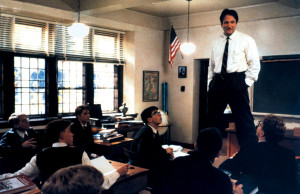
Please enjoy the first 400 words of “The God Glasses” from an anonymous submitter. I’ll have my critique after the excerpt. Please contribute constructive criticism in your comments.
***
Ella raced up the stairs as fast as her twelve year old legs could carry her. She had one objective, the same one every time—to escape the terror. She stopped mid-way and listened to her mother scream at her father.
“You never listen to me! You’re buried in your work, your motorcycle, or your sports. We wait for you to come home, but you never do. When you’re here, you’re somewhere else. Why don’t you just go away and never come back? Wouldn’t be much of a change—”
A slap and a heavy fall. Mama moaned—a pitiful sound, Ella thought. Her fists balled up at her sides, her legs shook.
She crept back down to the landing and peered over the railing into the kitchen. Daddy picked Mama up by the hair and backed her tight against the wall, his other hand knotted on her breastbone, pushing cruelly. He towered over her smallness, tattooed muscles bulging under his sleeves, face mere inches from hers. He wrenched her head back, forcing her to look up.
Mama’s wide eyes met hers. She blinked and a tear wetted her bruised cheek.
Ella gripped the rail. It creaked.
Daddy jerked his head up and smiled. He moved his hand from Mama’s breastbone to her throat and leaned in, thrusting his mouth next to Mama’s ear.
“You watch your mouth or I just might leave and never come back!” he screamed. Pulling back, he said, “What would happen to you and the girl if I left? How would you like that—to have to go and beg for help from that old woman up the street? Yeah, I thought not. So straighten up. I’m going out.” He snapped her head back. She fell again with a crash, upsetting the small side table which held his liquor and glasses.
“Clean that up before I get back,” he bellowed.
“Clean it up yourself, you pig—”
Ella ran, long dark hair streaming behind her. She stumbled on the top stair and fell to her face. She picked herself up, raced to her bedroom closet, and yanked the door open. She backed into the corner and sank to the floor, hands tight against her ears.
After Daddy leaves, I’ll go see Grandmother. She’ll tell me again about her God glasses. Maybe she’ll let me wear them.
She rocked back and forth, recalling better times.
***
FEEDBACK
First impressions, I like this author’s voice and the clear concise writing with visual imagery. Good use of the senses. On the surface, there is plenty to get drawn into with Ella. I like that the author stuck with the actions of the domestic violence scene and didn’t stray into backstory or an explanation. I’m rooting for Ella and love that the author has told the story through a twelve-year-old girl’s eyes. Domestic violence through a child’s eyes can be more powerful. Readers will want to protect her, but this first scene feels rushed for the sake of action. Violence like this should be more emotional, especially from a kid’s eyes. Make us feel Ella’s fear and helplessness.
We have clean copy and a solid start, but let’s dig deeper from a bird’s eye view to see how we can strengthen this scene.
ANOTHER OPENING SUGGESTION – The author has a choice to start with action (as in this case) or ground the reader into Ella’s world before the violence happens and build towards it. Anticipation can milk the tension in ways this action opening can’t. Would readers relate to Ella more if they got a taste of her world before the shocking inevitable happens? Should the author build toward a mounting dread that her father will be home or he’s late and both mom and daughter know what that means (without telling readers)?
In this opener, it’s my gut instinct when dealing with a young protagonist to show her world in a short punchy beginning that doesn’t slow the pace. Make every word count and build on what will happen with hints of foreshadowing. As much as I like the action in this opener, I can see how an unexplained growing tension between a mother and daughter can pique a reader’s interest more. Have Ella rushing to finish her homework from the safety of her small bedroom and not quite get it done because her mother yells for her to come downstairs to set the table. That would allow the reader to know what kind of mother she is before everything erupts.
Ella and her mother look at a clock ticking on a wall. When they hear boots climbing stair outside, they tense and wait for the door to open. He steps into the small apartment and he reeks of alcohol. Have Ella read her mother’s cues. Both women know what’s coming. How do they each react? Have patience for the scene to erupt and build on the natural tension.
In this current scene, Ella’s mom aggressively goes after the angered dad and puts Ella in danger. That makes both parents look bad. Is that the intention of the author? I don’t know. Let’s talk about character motivation.
CHARACTER MOTIVATION – This feels like violence that has happened more than once. If Ella’s mother is a battered wife, why would she taunt this man into beating her? She’s overly aggressive with someone who will punch her in the face and put her daughter in danger. It doesn’t feel natural, from a motivation standpoint. If the author would show more of how this anger is triggered and how the reactions would flow, the violence would be more grounded for the reader.
Also, Ella runs scared up the stairs, but turns around and comes back to watch. That feels like a cheat to the reader, to get them into the race up the stairs, only to deflate the tension by having Ella retreat. I can totally see a young kid who might want to protect the mom, stick around to watch. But that’s not how this began.
Make the reader understand why Ella might have a reason to protect the mom. By a slower build toward the violence, we could get a glimpse into Ella’s personality. Is she feisty or a beat dog? Is she ready to fight when her mother isn’t? Ella’s character motivation could be more interesting in this opener.
As a reader, I’m questioning character motives. The author should have patience to let the reader know the hearts of these characters. Contrivances (for the sake of action and tension) don’t allow the reader to buy into the story.
DIALOGUE – There are two long dialogue groupings – the first one when the mom goes after the dad. The second comes when the dad yells back. Because these are grouped together, they feel contrived and forced. Arguments, especially when there is violence, they are more believable if there is an exchange with shorter lines. Let the action ratchet up the tension and have the dialogue be punchy and shorter. More natural.
Have the dialogue get louder. Maybe have a neighbor yell and pound the thin wall, “Shut up or I’ll call the cops.” Then finish with the violence that will stop both parents. I can see him yelling down at her as she struggles to stay conscious.
“See? You drive me crazy. You always ask for it.”
RESEARCH – Abusers often blame their victims. It wouldn’t hurt to research the psychology behind domestic violence. Good research on motivation will add authenticity. Although there are lots of good books on the subject, I often look first at online articles on any given topic. These type of articles can inspire ideas on how to add impact to a scene. Here is a link to “The Psychological Wounds of Domestic Violence.”
COMBINE THE YELLING LINES? The long diatribe has the potential of losing the interest of the reader if it’s lumped together, without much grounding. Below is an example of breaking apart the dialogue groupings and combine them, with tensions escalating toward his first assault on her.
“You never listen to me!”
“Watch your mouth.”
“You’re buried in your work, your motorcycle, or your sports. That’s what matters to you. Not us.”
“Give me something to come home to. Look at you. You’re a mess.”
“Why don’t you just go away and never come back? Wouldn’t be much of a change—”
“Oh, yeah. What would happen to you and the girl if I left? How would you like it if you had to beg for help from the old woman? You don’t know how to make it alone.”
“Being alone is better than being with you.”
“You ungrateful pig.” (He strikes her)
WHAT WOULD ELLA DO? – What options does Ella have as a twelve-year-old child? Even if you didn’t change this scene much, I wondered what was going through Ella’s mind as she sat at the top of the stairs and watched her dad beat her mother. She must be in agony. I wanted the author to show the conflicts that must be raging through her. For Ella to sit on the stairs, without lifting a finger to call police or help her mom, that did not feel normal.
If you have the neighbor call the cops, the sirens could be wailing before he storms out, leaving Ella and her mom to deal with the aftermath. Ella would want to see if her mom is okay, wouldn’t she? Would she try to stop her father? The combination of Ella crying and fending off the old man, along with the cop sirens coming, could be enough to make the wife beater leave. But Ella running to hide in her closet, without checking on her mother, doesn’t seem heroic.
That’s why it matters to build on Ella’s world, even a little. A stronger foundation gets the reader in the girl’s corner from the start. We get a glimpse into her home life and how she feels toward her mother and father.
TITLE – I’m not sure what God’s Glasses have to do with the story. I like the title but I’m not sure why yet. It piqued my interest, but don’t rush to have Ella thinking about the old woman and God’s glasses. That feels like a contrivance for the sake of having a better opening scene cliffhanger. Be patient as the story unfolds. I’m sure there is something magical about God’s Glasses and Ella.
SUMMARY – This is the kind of story that would make it through a writer’s group reading with flying colors. It’s clean copy and there’s a lot to like about it. But as I read this strong opening, I had questions in my mind. Character motivation is a big one. Make it believable and real. Then ask yourself, is there a better way to start this? I don’t know if Ella will be a main character. I presume so, given the title, but it’s doubly important to have the reader think favorably of her from the first page. Or at least, be intrigued enough to turn the page. Have patience to portray your character. I normally love to start with action. Many of us do, here at TKZ. But with this opening, I thought a more deft hand in Ella’s portrayal was needed. What do you think, TKZers?
DISCUSSION:
Let me know what you think of this story, TKZers. I’m pretty sure we would all turn the page of this story, but what would you do to make this intro stronger?
Do you have different ideas on how to make this opening stronger?
Are there relationship elements between Ella and her parents that would enhance this scene?





